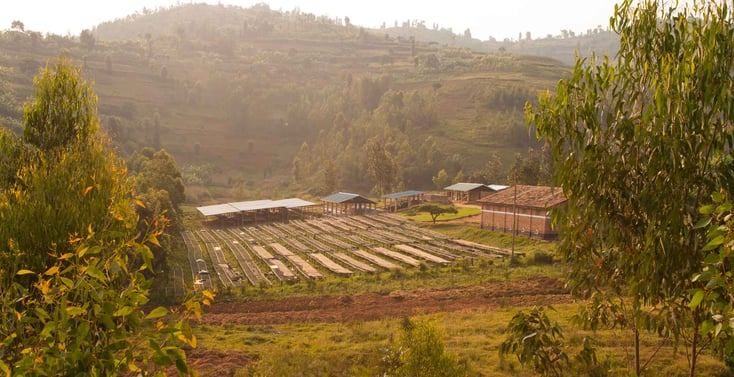
Are Rwandan coffees on your radar? If not, they need to be! The coffee industry in Rwanda has evolved tremendously in the 21st century and especially over the last decade. It's true that for most of the 1900’s, Rwanda was known as a producer of low-quality, commodity-grade coffee, focusing more on quantity than quality. But that all changed in the mid-90's as the Rwandan government began heavily developing the coffee sector, with a particular focus on specialty.
Today, Rwanda is one of the most stable countries in the East African region and produces some of the best specialty coffees available. We checked in with our team based in Kigali for a quick update from the field—read on to learn more about why we're so excited about Rwandan coffees!
________________________________________________
Since the '90s, the Rwandan government has heavily supported coffee, including supporting different intervention strategies to liberalize the sector, remove barriers to trade and exporting, planting new trees, improving cultivation initiatives, and dealing exclusively in high-tier specialty markets.
This initial growth was further buoyed by other actors—NGO's, social enterprises, philanthropists—that have been crucial to building the strength in the Rwandan coffee sector that we're seeing today. Sustainable Harvest's initial work in Rwanda began in 2001 as part of the USAID funded project, Partnership for Enhancing Agriculture in Rwanda through Linkages, or PEARL. Over the past 6 years, we're proud to have continued to work alongside incredible partners in Rwanda and be a part of further development; we're thrilled to see impact programs continue to evolve, take shape, and provide impact for women farmers, next generation farmers, and even the local coffee scene.
Rwanda has since been constantly working on ways to innovate all across the industry, from big campaigns with cooperatives, to working closely with different producer groups. One of their biggest campaigns led to the expansion and construction of coffee washing stations: over 100 were built in 10 years. In 2002, only two existed in the country; today, there are over 300. This development was crucial in the Rwandan coffee industry as it allowed rural coffee farmers to engage in international trade for the first time and earn a higher premium for their coffee. It was also vital to improving the quality of Rwandan coffee from commercial-grade to specialty.
 The Mushubati washing station at the Kopakama cooperative in the Western Province of Rwanda
The Mushubati washing station at the Kopakama cooperative in the Western Province of Rwanda
Despite the rapid development, there are no large scale coffee estates in Rwanda. All production is carried out by smallholder farmers with an average of 200 trees each, and each farmer is required to be a registered member of a cooperative. Cooperatives very often act as service providers, providing social programs to their members or offering members space to participate in entrepreneurial and developmental activities. For example, women’s organizations are very common within coffee cooperatives, enabling women coffee farmers to organize microfinance groups, develop their agricultural skills and expertise, or attend external training.
Our producer partner, Abakundakawa, is a great example of a cooperative that has developed a number of producer-focused projects to support their members. Abakundakawa was one of the first co-ops to promote women in Rwanda's value chain through their women's association, Hingakawa. These women produce as much as two-thirds of the co-op's entire coffee output. Their beans are processed and marketed separately from the rest of the co-op, bringing income directly into the co-op's female members' hands.
Besides supporting women's projects, Abakundakawa has partnered with international NGOs to provide its members with health insurance and to improve food security—including their most popular program which gives members dairy cattle, provided they return the first calf from each cow received back to the co-op.
Adaptation, Innovation and Growth
The drastic restructuring of the coffee industry in Rwanda has led to a more efficient and valuable export sector that accounts for 400,000 smallholder farmers. Rwanda is unique in that the country produces almost exclusively specialty coffee—98% of the coffee produced in the country is Arabica, and 95% of that is Bourbon. Due to its size, Rwanda will never be a big player as far as volume is concerned and have instead gone all in on quality. Rwanda also happens to be one of the few African countries with a growing number of Fairtrade and organic certified producer organizations.
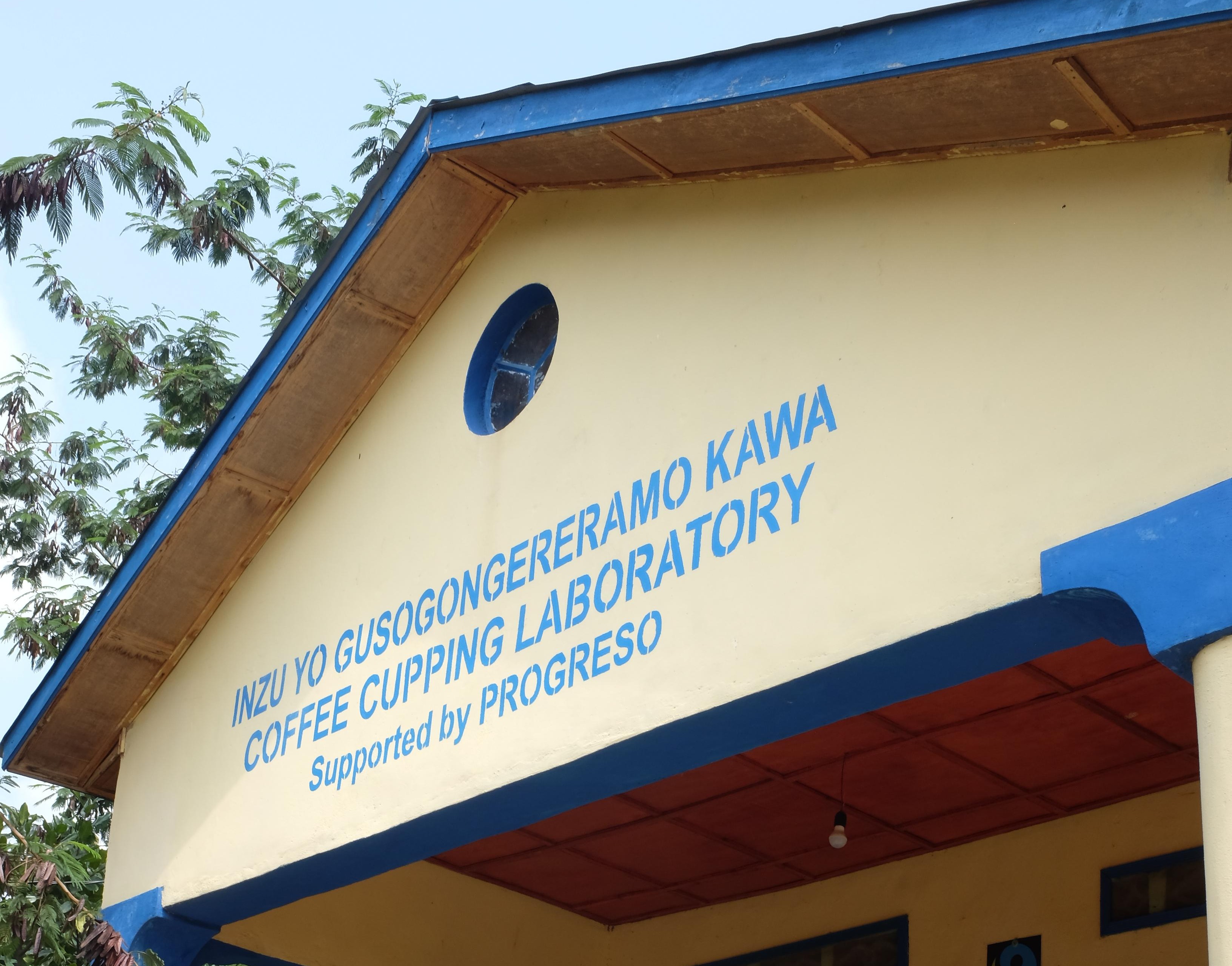 The coffee laboratory at Sholi in the Southern Province of Rwanda
The coffee laboratory at Sholi in the Southern Province of Rwanda
Domestic consumption has also sharply risen in recent years. Tech and service industries have been experiencing a "boom" in Kigali; the emergence of young professionals and expats have increased the demand for coffee shops and opened up the market for in-country roasters. It’s a side of the industry that’s likely to grow and has since become a key part of the national coffee strategy.
Recent Farmer Projects
We’ve worked extensively with producer groups in Rwanda over the years, and in the last year we joined Challenges Worldwide to be part of their five-year project “Coffee Market Building for Peace and Prosperity,” which works with eight coffee cooperatives across Rwanda to support infrastructural development, increase the value of their coffee, reach international specialty markets, and ultimately raise the standard of living for these producers.
The inspiration behind the project, according to Neil Walker, Programmes Lead for Challenges Rwanda, was drawn "from our 'marketbuilder' approach to rural development; that is, our commitment and belief in socio-economic change through supporting increased, inclusive and long-term economic activity that creates jobs, as well as developing market linkages whether urban-rural or exporting to international markets."
The goals of the project overall are "to reduce, or positively impact, the number of systemic barriers to economic growth for Rwandan cooperatives and the communities around them. This is through a combination of business management training made relevant and practical by our 'Human-Centered Design (HCD)' approach, working with women groups to develop financial literacy and undertake economic activities like beginning their own enterprises, or through the work of Sustainable Harvest in supporting the improvements in quality, international exposure, and introduction of partnerships that boost profitable exports."
Sustainable Harvest’s role in this project has been primarily in quality control and market access development. Our Rwanda based team supports these cooperatives by offering feedback on samples, conducting trainings on quality standards, and providing advisory services on coffee contracts, export operations, and certification protocols.
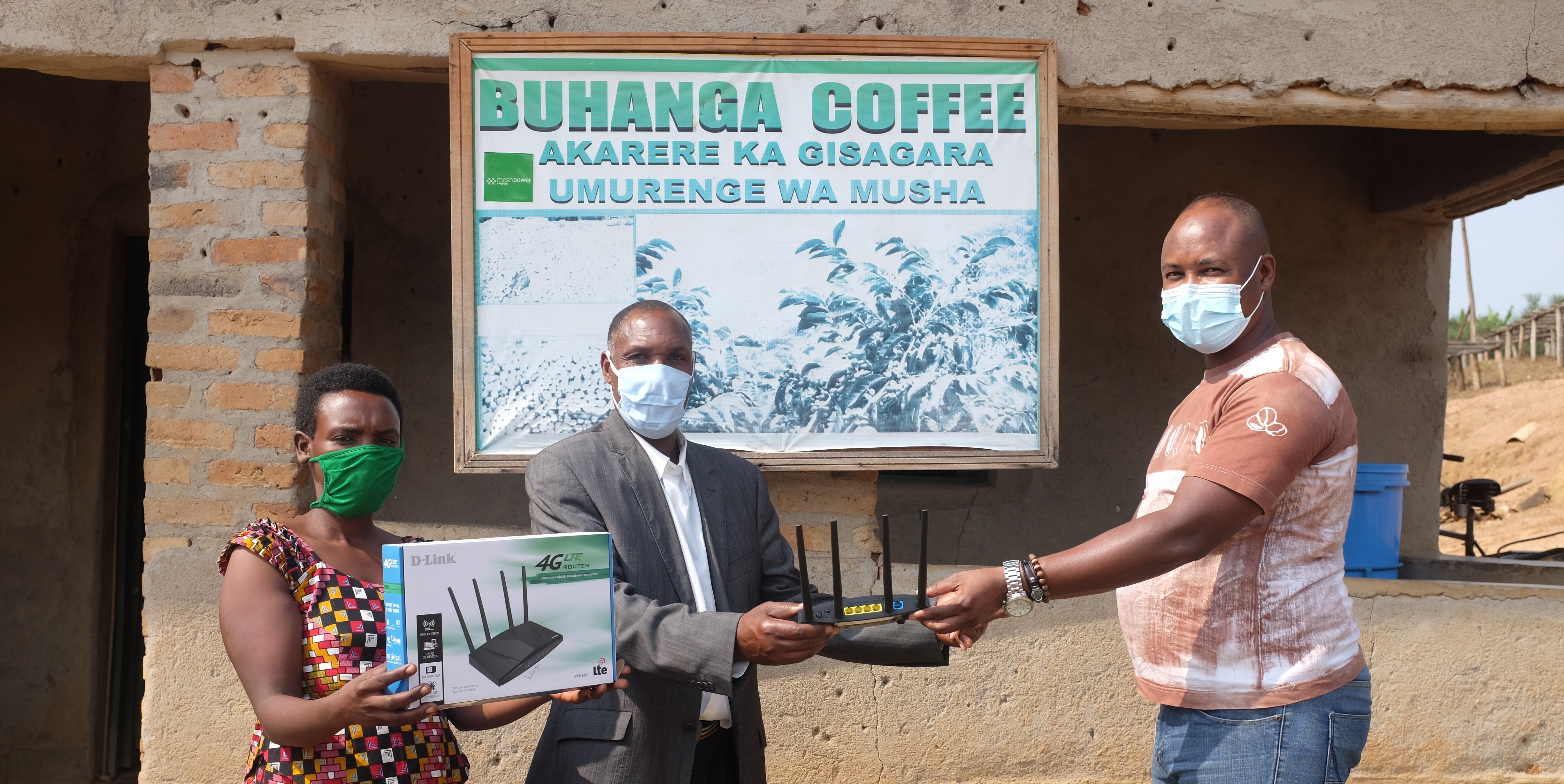
In our most recent field visit just a few weeks ago, our team visited each co-op to help build their online presence and expand their reach to more buyers. We installed 4G routers at each cooperative, and showed members how to use conferencing platforms like Zoom and WebEx to facilitate communication between co-ops and stakeholders from across the coffee supply chain. Our team even helped to set up accounts on social media platforms like Instagram which can be powerful tools for providing a personal level of connection between buyer and producer— and the younger members were definitely excited about it! This level of digital connection was something that, until this point, was not a reality for many members; now all full-time staff will be able to engage on social media, have an easy way to provide field updates, and be able to join meetings, webinars and stay informed about trends in different markets across the globe.
One of the most exciting outcomes of the project, and one we’re most proud of, has been the enrollment of three of these groups onto our MVP program! The evaluation process for membership into the MVP Program isn't easy, but it ensures that the producers who are selected are meeting high standards of coffee quality and cooperative management. This evaluation takes into consideration areas of operation ranging from quality control, to governance and management, to social and environmental sustainability. The selection of three of the groups from this project is a testament to the impressive development of these producer organizations and credits them entirely for the maturity and superiority in communication, management, and increasingly high cupping scores.
The development of one of these cooperatives that we’d like to highlight, Buhanga in the western province, has been incredible to be a part of. Buhanga has been remarkable in their commitment to environmental sustainability and have spearheaded such initiatives like operating entirely on solar power and implementing water filtration systems to recycle all water used at the washing station back into the local water supply for use by the entire community.
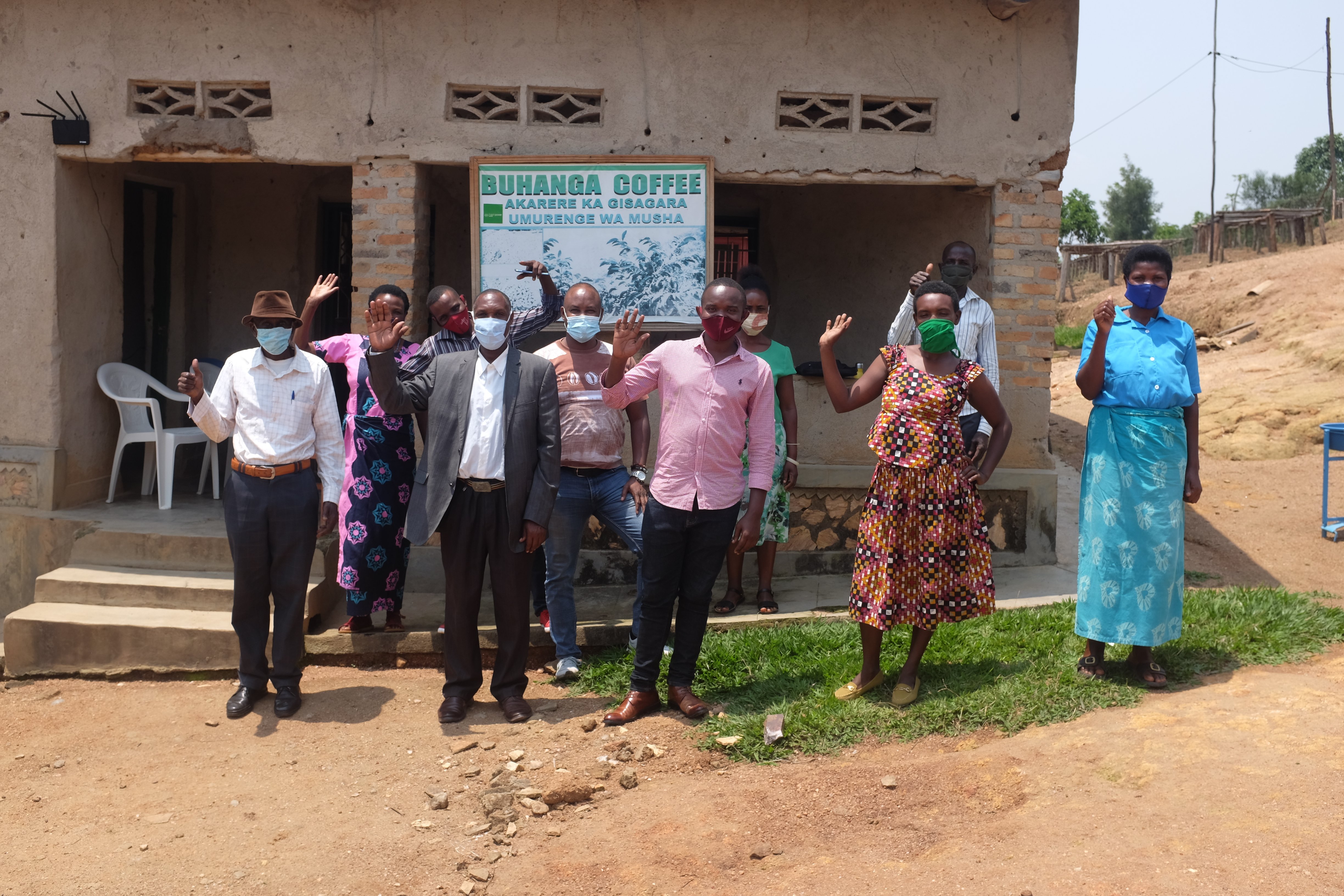
As a result of their dedication, we are thrilled to say that Buhanga will now have the opportunity to export their coffee internationally for the first time and receive nearly five times the price for their coffee than they were receiving previously.
________________________________________________
What to Expect from Rwandan Coffee
Mention East African coffees and most people will immediately think of delicate, tea-like, bright, floral cups of coffee bursting with lemony, electric citrus notes—think washed coffees from Yirgacheffe in Ethiopia. Or perhaps Kenyan coffees will come to mind with their unmistakable profile of sugary ripe tropical fruit, big body, and an acidity that makes itself loud and clear.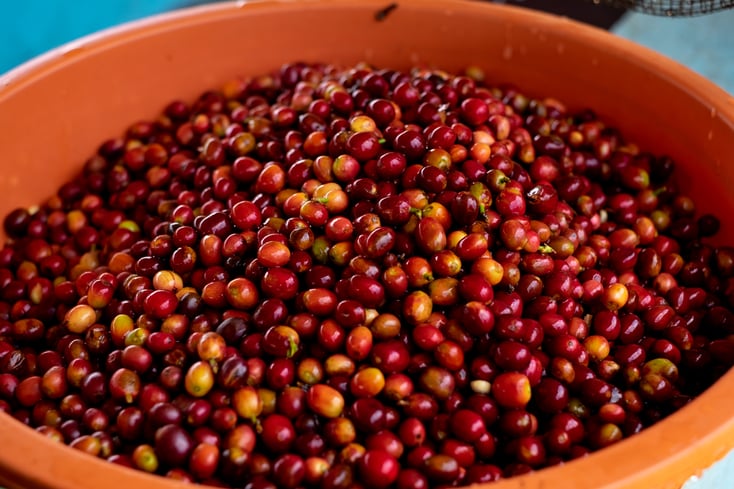
Rwandan coffees share this same expressive fruit character and complexity, and can have many of the same defining notes—but we think Rwandan coffees have an advantage over their East African neighbors through the versatility that Rwandan coffees have to offer. We find that Rwandan coffees can be more approachable and tend to be more balanced with big notes of chocolate, brown sugar, and caramel sweetness that remind us of our favorite coffees from Central America. Rwandan coffees can be fruity, juicy and bright, but their more tempered profile makes them a coffee we can sip on day after day. While that Ethiopian coffee might be one that we pick to change things up once in a while, it’ll be a Rwandan coffee that we turn to for our daily brew.
We're looking forward to seeing Rwanda shine more year after year, and we’re excited for more people to discover the fantastic potential that Rwandan coffees have.



.png)
